- Augusta University
- The Graduate School
- Student Spotlights
Student Spotlights
Strength in Authenticity: Hannah Lewis on Creativity, Identity, and the Counseling Journey
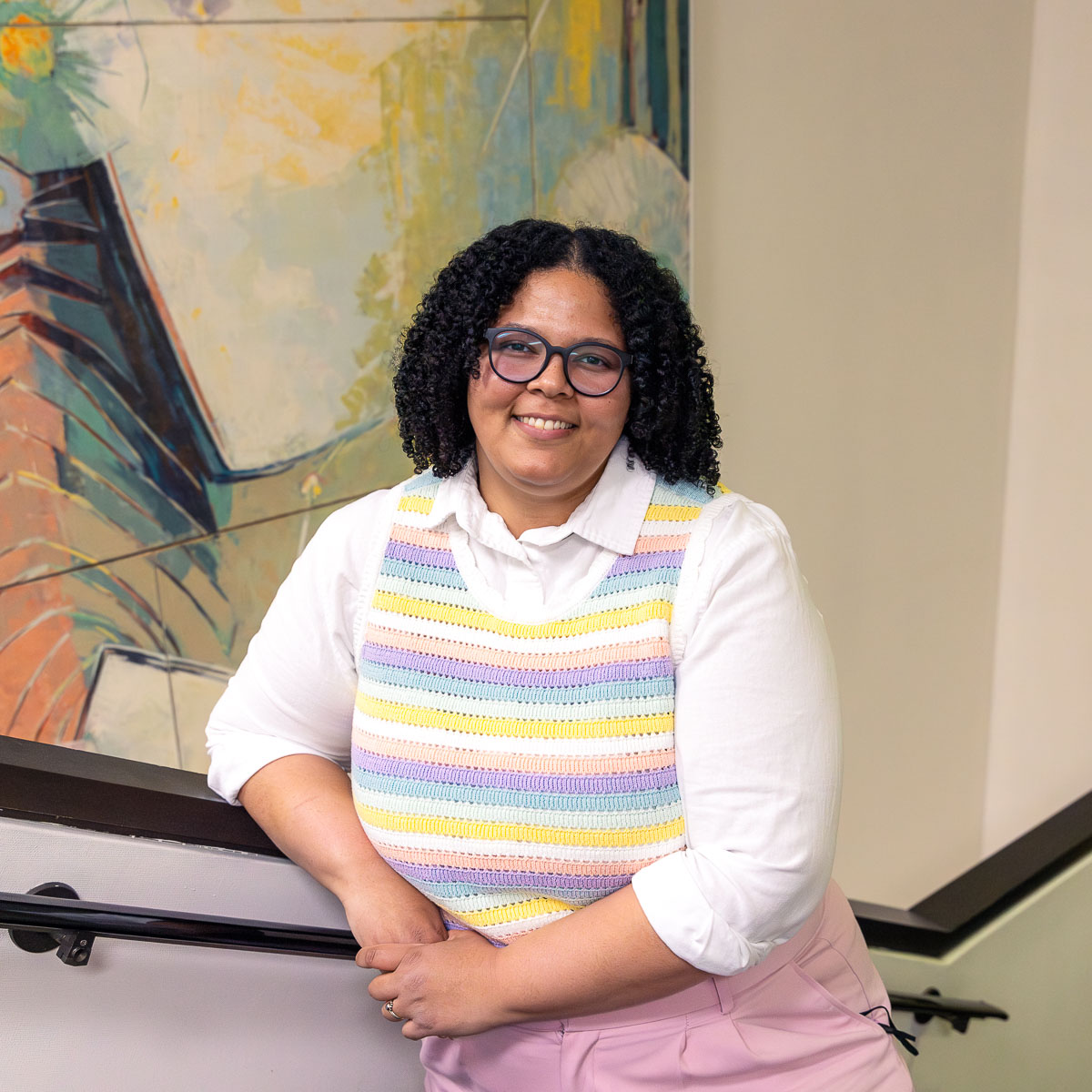
"Be brave and take that first step. This work is challenging but it can be so fulfilling."
This month, The Graduate School is proud to feature Hannah Lewis, a graduate student in the Master of Education in Counselor Education program. Hannah brings a unique blend of creativity, empathy, and authenticity to her work, drawing from her artistic background to connect with clients in meaningful ways. Her journey reflects a deep commitment to representation in counseling and a desire to help others feel seen and understood. In this Q&A, she shares the experiences, mentors, and moments that have helped shape her path.
What inspired you to pursue a Master of Education in Counselor Education, and what drew you specifically to Augusta University’s program?
I was inspired to pursue my Master of Education in Counselor Education because I recognized how difficult it was for me to find a therapist who looked like me or reflected certain aspects of my lived experience. For many folks, myself included, it can be challenging to heal when you feel as though you have to explain every aspect of your identity to your counselor. I wanted to be the representation that is missing in this profession. I was drawn to this program in particular because of the amazing faculty and welcoming environment that they strive to cultivate. I was also drawn to the various opportunities that AU offers its graduate students when it comes to funding and scholarships, as this really sets our university apart.
Dr. Cokley has had a profound impact on my professional development. Her presence, perspective, and encouragement have shaped my understanding of what it means to be a great counselor. She has shown me that my experiences and authenticity are valuable, not just for my clients but in general. Her classes are challenging and transformational, and she shows up for her students both within and outside of the classroom. She inspires me to be intentional and curious, while also reminding me to practice self-advocacy and self-compassion. She also played a huge role in helping me apply for and earn the NBCC Minority Fellowship, for which I am incredibly grateful.
What has been the most meaningful part of your training so far?
The most meaningful part of my training so far has been starting practicum and applying the skills I have been developing over the past year with actual clients. It is gratifying to see how my hard work up until this point is allowing me to make a difference in my community, and it is humbling and inspiring to bear witness to my clients’ growth.
Were there moments in the program when you doubted yourself? If so, how did you navigate those challenges?
Initially when I began this program, I felt like I was at a disadvantage because of my Bachelor's in Fine Arts. I wondered if I would fall behind in class or whether my classmates and professors would take me seriously. As I began to take classes and get to know the faculty and my cohort, however, I learned that each of us brings something different to the table and that my unique perspective is a strength rather than a weakness. Now I embrace my creativity in the therapeutic context, and I am proud of the way that my artistic training sets me apart. I am also fortunate enough to have the opportunity to integrate my skills and promote healing through expressive arts interventions, which is something I think little Hannah would be so excited about!
What advice would you give prospective students considering the Counselor Education program?
Be brave and take that first step. The world needs compassionate counselors just like you! Reach out to the faculty, current students, or alumni and ask about the program. I am sure that you will find that this is a kind and supportive community of people who want you to succeed. This program offers you countless opportunities to learn about yourself, examine your biases, and grow—and you get out of it what you put in, so come prepared to look inward and work hard, and you will reap the benefits. This work is challenging but it can be so fulfilling. Self-care is critical for counselors-in-training and veteran counselors alike. If you begin developing habits that contribute to your overall wellness now, you will establish a foundation for your future self to thrive!
Exploring Possibilities: Cole Jordan on Research, Growth, and Next Steps
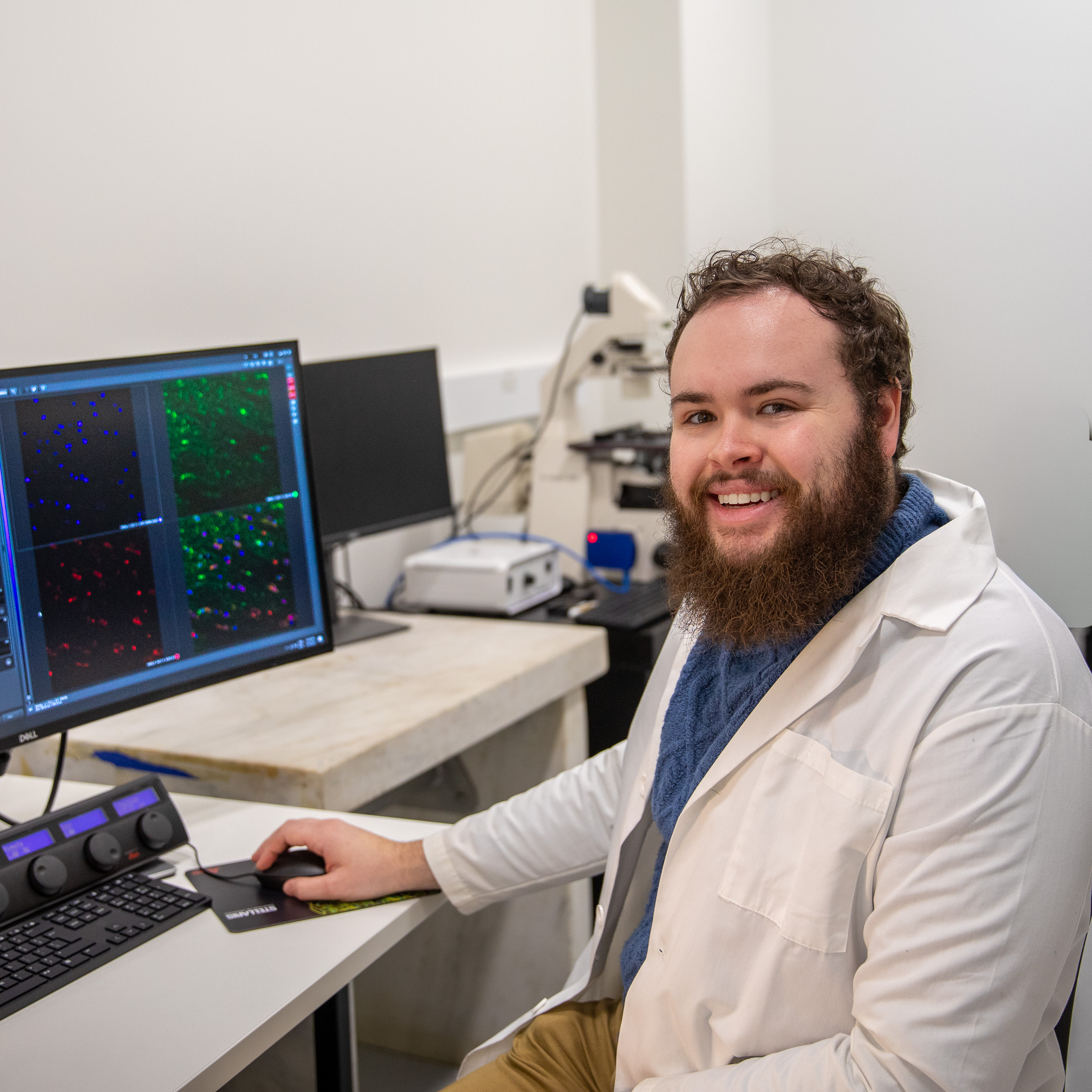
"I've learned how to better motivate myself. It's fun designing experiments and being able to see the results."
This month's spotlight is Cole Jordan, a graduate student in the Master of Science in Biomolecular Science program at Augusta University. After gaining hands-on experience working in a university lab, he returned to graduate school to deepen his scientific training and clarify his long-term career goals. His journey reflects both the challenge and reward of reentering academia, as well as the value of exploring diverse pathways in science. In this Q&A, Jordan shares insights into his research on developmental myelination, lessons learned from returning to student life, and how the program is preparing him for the next step - applying to medical school.
What inspired you to pursue your master's degree in biomolecular science at Augusta University?
I was previously working in a different lab at Augusta University and knew I wanted to pursue a graduate degree, but I wasn’t sure whether a PhD was the right path for me. After weighing my options and learning more about different programs, I discovered that pursuing an MS would allow me to dive deeper into research and make a meaningful impact in my field.
Can you share a bit about your current research or thesis project?Currently, I am studying the effect of the histone demethylase, JMJD1C, in the role of developmental myelination. This research looks at how a specific protein influences the way nerve fibers in the brain get their protective coating as they develop. This coating, called myelin, helps signals travel quickly and efficiently in the nervous system.
What challenges have you faced in your graduate studies and what lessons did you learn personally and professionally?
I was out of school for three years before starting the master’s program, so getting back into the student mindset was a struggle at the beginning. Since starting the program, I’ve learned how to better motivate myself. It’s also been fun learning more about how to design experiments and being able to see the results of those experiments.
How has your program shaped your perspective on biomolecular science and career opportunities?
It helped show me that there are other career options outside of just academia. I am currently preparing to apply to medical school next year, and this program is helping me prepare for the next step.
If you were to start over again, what advice would you give to yourself or a prospective student considering the MS in Biomolecular Science program?
If you’ve been out of school for some time, be prepared for the adjustment of returning to student life. Both program directors are very kind, and the PIs are always willing to help.
Four Degrees, One Purpose: Tyra Newton on Improving Lives Through Compassionate Care

"Everything you learn will go with you to the bedside or the office. So enjoy the journey. Breathe. Give yourself some grace."
This month’s Student Spotlight features Tyra Newton - Quadruple Jag and Fall 2025 DNP graduate. Her ambitious spirit, love for learning, and heart for oncology all shape her path toward impactful, patient-centered care. She shares about the importance of leaning on your support system, embracing the journey, and pursuing excellence in all that you do.
What inspired you to pursue your DNP and why did you choose Augusta University for your graduate training?
I knew I wanted to go further in nursing to be the best provider that I can be, and I truly enjoyed the Certified Nurse Leader MSN program. The support, care, and knowledge I received gave me the confidence to pursue anything and everything. After starting here and meeting the incredible faculty and staff, there was never a question about where I would go for my terminal degree. They have been with me throughout my entire journey and will be there for my hooding. As a student, and now as their colleague, the experience I had left no doubt that Augusta University would be the institution where I continued my training.
What advice would you give to prospective students considering the DNP program?
Give yourself time and enjoy the journey. It’s not just about matriculating - it’s about the people you meet, the classes and clinicals you experience, and the knowledge you gain. Those are the pearls you collect along the way. You’re not just checking a box; ask yourself, “What am I learning?” Everything you learn will go with you to the bedside or the office. So enjoy the journey. Breathe. Give yourself some grace.
Can you tell us about your specialty area and why you chose it?
I feel like oncology chose me. I can’t see myself practicing in any other area right now, and it all goes back to the knowledge and teaching I received from AU. With oncology, you’re continually learning. That’s the great thing about cancer research – there’s always something new, and that progress helps improve patient outcomes. We meet people at the worst point in their lives in hematology and oncology. You have to have patience and understanding, and you have to give compassionate care. Yes, patients care about the knowledge you have of their diagnosis, side effects, and chemotherapy, but they also want to know your heart. They need compassion, and that means so much more because anybody can just read information from a book.
Were there any moments along the way where you doubted yourself, and if so, how did you overcome them?
My faith has carried me a long way, along with the support of my family, my husband, my work family, and my school family. Over the years, I’ve built strong relationships - from clinical pathology to nursing and now as a provider. Those connections have been invaluable. Even during moments of doubt, I could lean on professors for guidance and a listening ear. It’s really about having that support system and remembering we’re not meant to do this alone.
Strategic Vision: Samantha Mullis on Business, Leadership, and Lifelong Learning
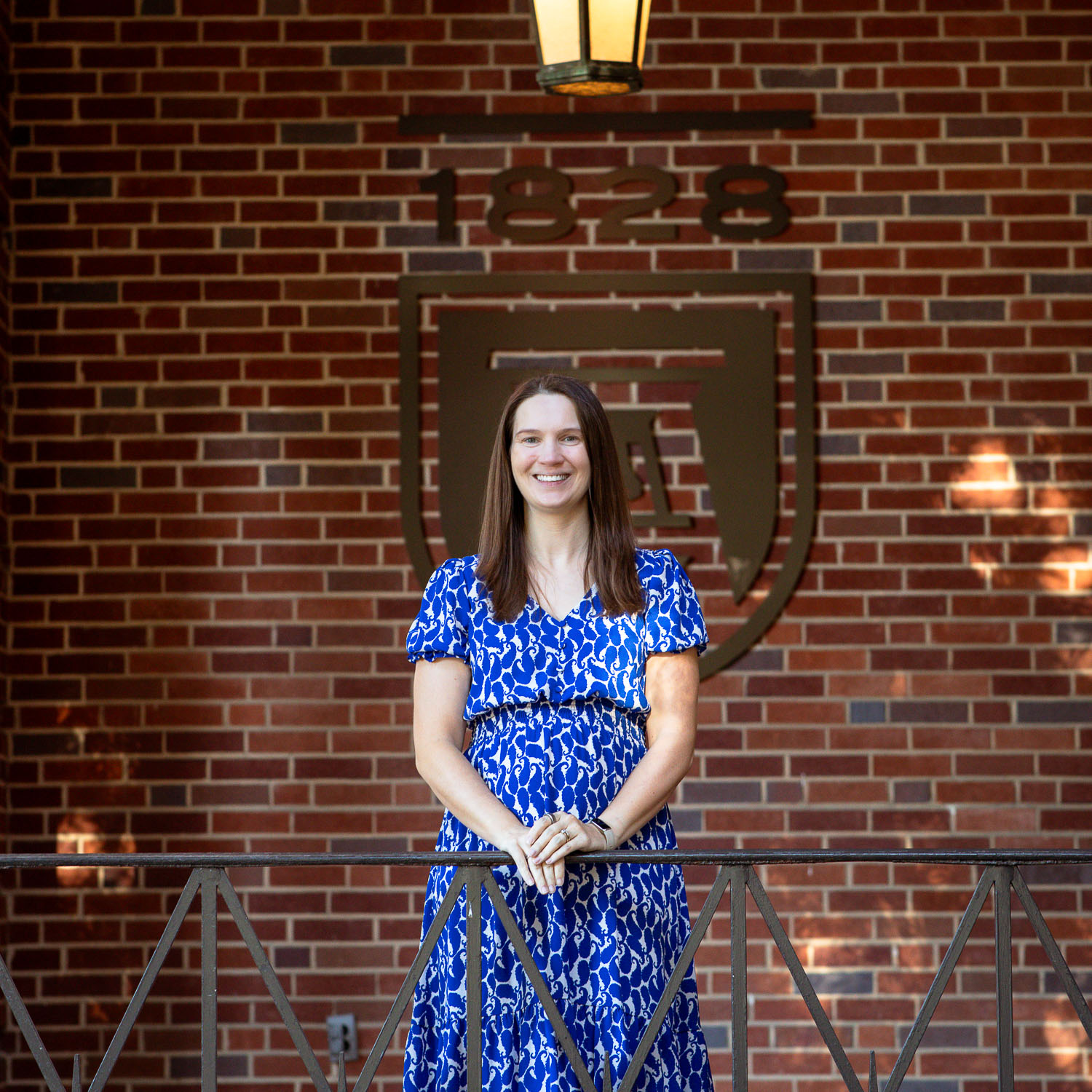
"I've always been a lifelong learner. The idea of progress motivates me."
The Graduate School is proud to feature Samantha Mullis, an MBA student in the Hull College of Business who also serves as Associate General Counsel at Augusta University. Her journey reflects a deep commitment to personal growth, leadership, and institutional impact. Mullis brings a unique blend of legal expertise and business insight to her role at the university—driven by a passion for collaboration, strategic thinking, and continuous learning. In this Q&A, she shares how her MBA studies are enhancing her ability to serve the university, what motivates her to keep pushing forward, and why she believes education is always a worthy investment.
What inspired you to pursue your MBA and why did you choose Augusta University for your graduate training?
An MBA was something I considered getting as a joint degree while I was in law school, but I decided against it at the time. Since taking on this role as in-house counsel, I have seen the benefits of being business minded along with giving solid legal advice. I chose Augusta University because it’s where I work and the Tuition Assistance Program makes it affordable.
Is there a particular area - legal, business, or otherwise - that you feel especially passionate about impacting?
Augusta University, obviously. I get most excited when I’m working on a strategic project to move the institution forward. I’m also passionate about impacting the culture and stigma of “Legal".
While we do have a role to mitigate risk to the University, I want to help shift the perception of our office from being an obstacle to being a true partner in problem-solving. My goal is to foster a culture where faculty and staff see Legal as a collaborative, approachable resource that empowers them to move their initiatives forward responsibly. When we’re engaged early in the process, we can work together to achieve creative, compliant solutions—avoiding reactive noncompliance on the back end.
Can you tell us about your work as Associate General Counsel at Augusta University?Ultimately, my role as an Associate General Counsel is to support the mission of AU by ensuring that we are as legally compliant as possible. Augusta University is especially unique due to the complexity of programs, research institutes, and clinical programs such as the Medical College of Georgia and Dental College of Georgia. We also employ over 6,700 faculty, staff, and other subgroups which bring their own legal requirements. Day-to-day I advise on a variety of legal issues that touch higher education. My portfolio involves the simplest contracts to advising on complicated litigation matters. My days are never the same, and not knowing what’s next from one of my fellow colleagues across campus makes the job all that more exciting.
What motivates you to keep learning and growing both in your legal career and MBA studies?
I’ve always been a lifelong learner. I’m also highly competitive with myself and looking for ways that I can be better. A better person, a better wife and mother, a better lawyer. I have been fortunate in my career to work for offices and firms that support professional development, and Augusta University is no exception. I guess, the idea of progress motivates me.
What advice would you give to prospective students considering the MBA program at Augusta University while working full-time?
That’s an easy one – do it. Just like you never regret a workout, I don’t think you regret furthering your education either. For prospective students who are also working full-time, my biggest advice is to find your people. Your people will be those that support you and keep you grounded. Communicate with them often. For me, that’s mainly my spouse and the friends I’ve made in class who are also full-time professionals. Being upfront about your schedule and honest about what’s on your plate helps manage expectations, balance household responsibilities, and navigate the inevitable group projects more smoothly.
Drawing Connections: Keri Alber on Communication and Creativity in Healthcare
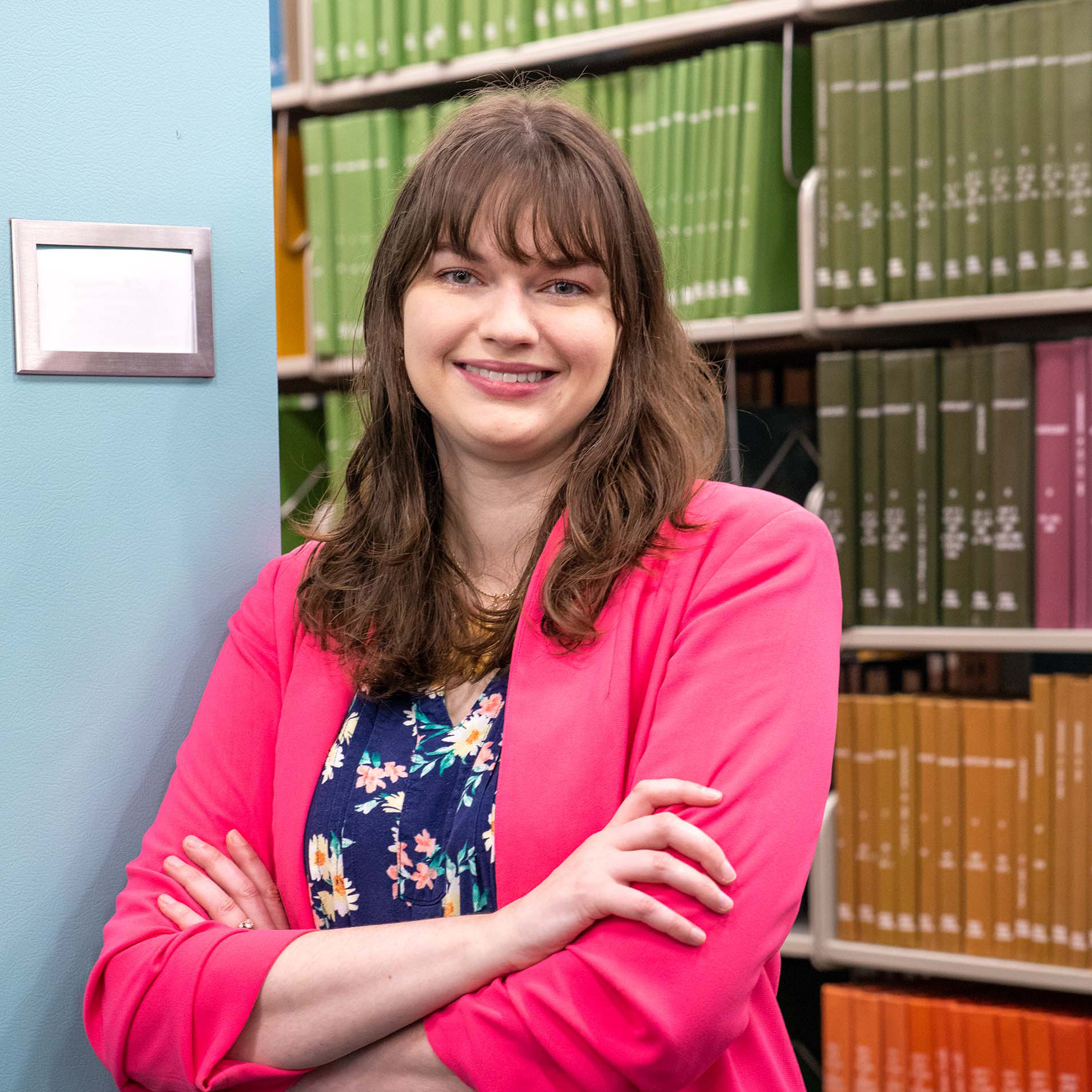
"Remember why you started, lean on your support network, and make time for rest and activities that recharge you."
his month, The Graduate School shines a light on Keri Alber, a student in the Applied Health Sciences PhD program whose research blends creativity with communication to improve patient care. A dedicated Augusta University alum, Alber returned for her doctoral degree drawn by the program’s flexibility, interdisciplinary focus, and supportive environment. In this Q&A, she shares how her innovative research on visual communication in medical education is filling a critical gap, how qualitative methods reshaped her approach to research, and why staying grounded in purpose—and supported by community—is key to thriving in graduate school.
What inspired you to pursue your PhD in Applied Health Sciences and why did you choose Augusta University for your graduate training?
I decided to pursue a PhD in Applied Health Sciences to advance my career and deepen my expertise. I chose Augusta University because of the flexibility to earn the degree while continuing to work full time, which was essential for me. I also earned my Bachelor’s and Master’s here. I was especially drawn to the program’s focus on interdisciplinary learning and its commitment to preparing students for both academic and professional career paths.
Can you tell us about your research focus and what excites you most about its potential impact?
My research focuses on teaching medical students how to draw to communicate with patients and exploring how this training affects both the students and the patients themselves. What excites me most is the opportunity to address a clear gap in the existing research around this communication approach. I’m passionate about not only demonstrating its benefits but also encouraging others in the medical field to adopt and integrate this method, ultimately improving patient care and outcomes.
Have you had any “aha” moments in your research or studies that changed your perspective?
One of my “aha” moments was learning the value of qualitative research. Not just for the depth of insight it offers, but also how engaging the analysis can be. It feels like solving a puzzle, synthesizing and piecing together narratives to uncover patterns and meaning. The course on Qualitative Methods changed my perspective on how qualitative methods can be used, especially when integrated with quantitative data. I now appreciate the strength of mixed-methods research in providing a more comprehensive understanding of complex issues by combining the richness of qualitative data with the structure and scale of quantitative analysis.
What motivates you to keep going on tough days?
I love learning, so the pursuit of knowledge keeps me motivated. I’m also motivated by my long-term career goals and the belief that the effort I put in now will open up greater opportunities down the line. Most importantly, the support and encouragement of my spouse, family, mentor, and colleagues keep me grounded and remind me why I started this journey in the first place. My advice to prospective students is to maintain a strong work-life balance and build a reliable support system. Staying organized and motivated is key. Remember why you started, lean on your support network when needed, and make time for rest and activities that recharge you.
A Worthy Pursuit: Hunter Sellers on Science, Growth, and Grit
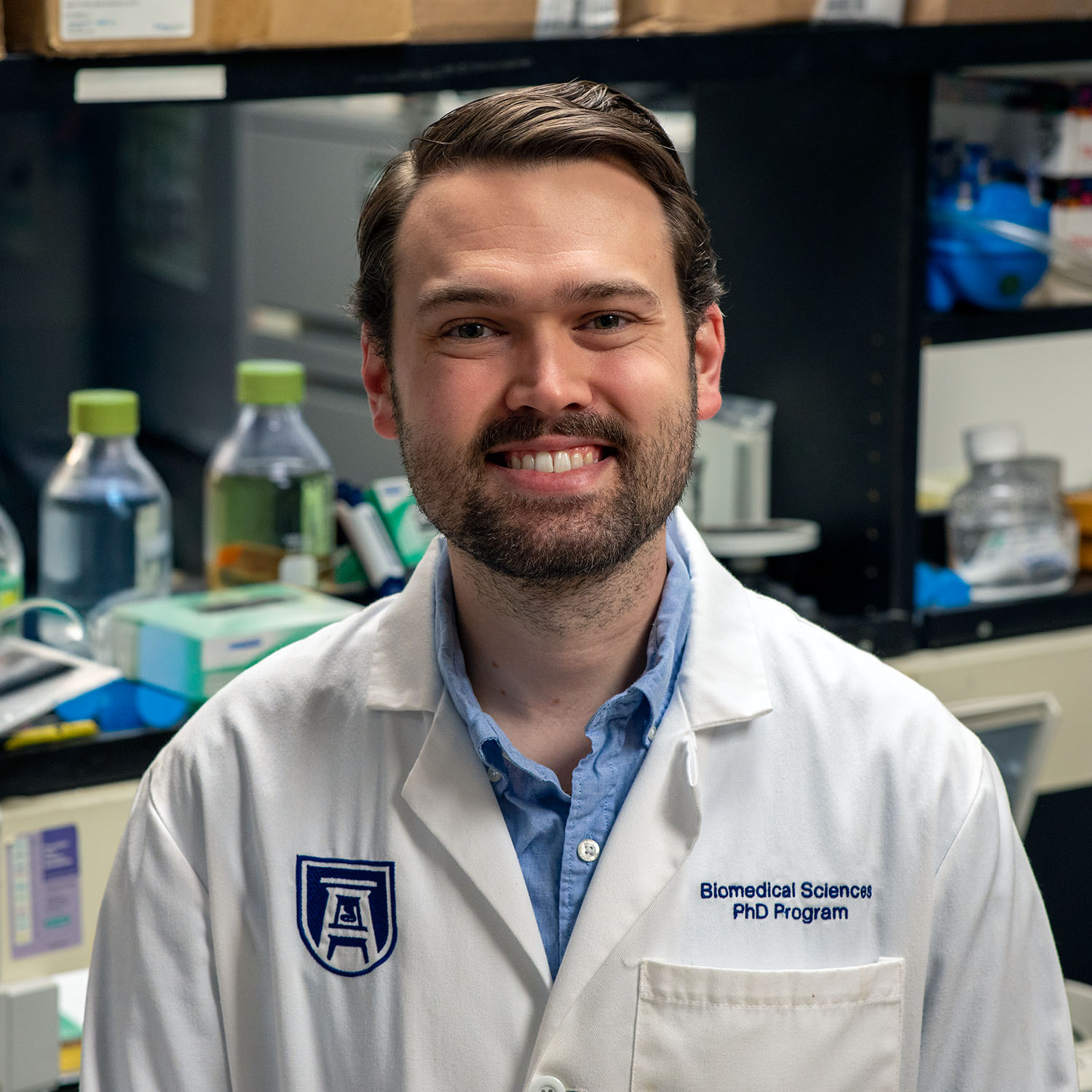
"Take on challenges that seem daunting and view that feeling of intimidation as a mark of a worthy pursuit."
The Graduate School sat down with Vascular Biology PhD candidate, Hunter Sellers, whose journey through vascular biology, intellectual property law, and scientific communication reflects both his curiosity and determination. In this Q&A, he shares how his undergraduate experience in TGS' undergraduate Student Training And Research (STAR) program influenced his decision to study at AU, what drives his work on obesity and cardiometabolic disease, and how his recent success on the patent bar exam is shaping a unique career path at the intersection of science and law.
What inspired you to pursue your PhD in Vascular Biology and why did you choose Augusta University for your graduate training?
My reasons for coming to Augusta University were numerous, however my main draw was the experience I had during the STAR program back in 2018. I spent the summer in the laboratory of Dr. Neal Weintraub, and I thoroughly enjoyed the environment. The VBC was dynamic and friendly, and the faculty were adamant that the focus would be on student success if I were to return for my graduate studies. Upon applying to graduate schools, the other schools I interviewed with didn’t quite match the vigorous commitment to individual investment and excellent training.
Your research centers on vascular biology — can you share what excites you most about your work and its potential impact?
My major advisor, Dr. David Fulton, recently used a metaphor that I think is pertinent to this question: The contribution of basic research to improving human health is a big wheel that we all push forward. My work on obesity and cardiometabolic disease is no different. I hope that the field of obesity will find utility in the models I’ve created and use them to push the wheel even further towards a world with less burden of chronic disease.
Congratulations on recently passing the patent bar exam! How do you see combining your background in biomedical sciences with intellectual property law shaping your future career path?
Thank you so much! The exam is notoriously difficult and the preparation for it is no joke, but a few months of diligent studying makes the exam a manageable hurdle. Appropriate technical expertise is vitally important in providing competent representation to clients before the United States Patent and Trademark Office. The world-class molecular biology and biomedical training I have received through Dr. Fulton’s mentorship will be instrumental in my ability to take client’s inventions and turn them into robust intellectual property.
hat has been the most rewarding part of your graduate school experience at Augusta University—whether in the lab, in the classroom, or through mentorship?
The highlights of my graduate school experience have been centered around the numerous opportunities to communicate my research with others. Whether that be through training new students in lab, choosing the right turn of phrase during a presentation, or writing a persuasive argument in a manuscript, that moment when understanding clicks for the audience brings a huge sense of satisfaction.
What advice would you give to prospective graduate students who are considering Augusta University for their PhD studies?
I strive to be a person with few strong opinions; however, one opinion I do hold firmly is that education should be a deeply uncomfortable endeavor. Education should broaden world views and stretch capabilities in ways that can be quite unsettling. My advice would be to take on challenges that seem extremely daunting and to view that feeling of intimidation as a mark of a worthy pursuit.